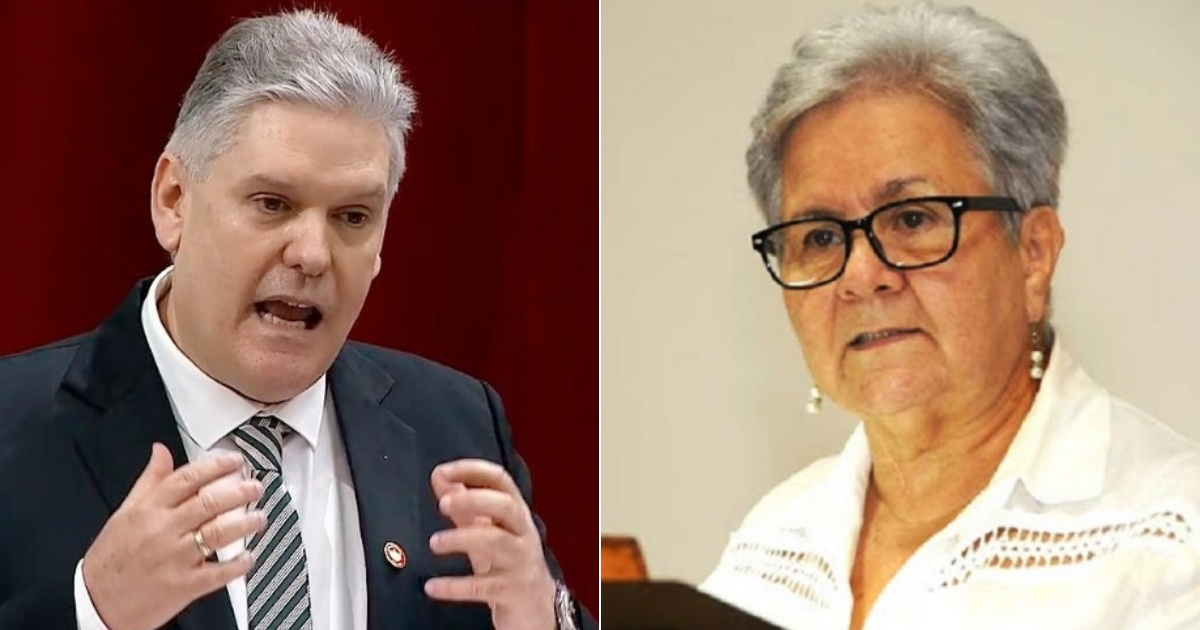For the first time since it was revealed in March that former Cuban Economy Minister Alejandro Gil was under investigation for alleged corruption, a high-ranking official has publicly addressed the issue. The responsibility has fallen to Gladys María Bejerano Portela, the Comptroller General of the Republic of Cuba, essentially the top auditor of ministries and companies in the country.
Bejerano Portela, 77, who served as Vice President of the Council of State from 2009 to 2019, did not hesitate to label the incident as "betrayal" in an interview with the Efe news agency. She emphasized that corruption does not occur "out of the blue" but is clearly a process of degradation.
Gladys María Bejerano, who has led the General Comptroller’s Office for 15 years and has been auditing for 20, advocates for extracting "lessons" from this "sadly negative lesson." Without directly naming the ousted minister, she admitted that it "hurts a lot."
"It hurts, it hurts a lot because you think as a colleague—as a Cuban—that someone who has been at that level, handling situations and the sacrifices that had to be made, would have a corresponding attitude. One really feels it as betrayal, as something that is not right," she pointed out.
She quickly composed herself and argued that beyond the surprise, "there is morality and bravery to face" this bitter pill. "Every time there has been an incident, it has been made public. I can assure you of that," said the member of the Central Committee of the Communist Party of Cuba (PCC), convinced that "sooner rather than later and as objectively as possible," all information will be provided.
Bejerano stressed that the Cuban government does not downplay corruption "whether it is from the bottom or the top," although she understands this case has "more significance." She also clarified that the investigation into Gil Fernández did not originate from the General Comptroller’s Office, though she did not specify its source.
The Corruption Issue in Cuba
Bejerano acknowledged that times of scarcity and crisis foster illegalities and criticized people who take advantage of these situations, even "cruelly." "People do not fall into corruption out of the blue; it is a process. Corruption is decomposition; it is a process of losing values, self-esteem, and self-respect, which then sets one on that path," she added in statements to journalist Juan Palop for Efe.
She asserted that some individuals become corrupt "out of arrogance, vanity, or presumption," and emphasized that neither state officials nor private individuals will be allowed to commit such crimes, though she stopped short of mentioning leaders.
She indicated that 76% of detected illegalities in Cuba occur "at the grassroots level" and that her "battle" is to reduce them to "zero" as a matter of "principles" and "convictions" of the revolution. Bejerano admitted that 23% of the country's control systems have deficiencies, mainly due to a lack of technical or human capabilities. For instance, only 60% of the General Comptroller’s Office positions are filled.
"The controls are not at the level" that the General Comptroller’s Office desires and that the country, the government, and the PCC need, she acknowledged. "We want honest, hard-working people to be able to have their businesses in order, fulfilling their obligations to the tax authorities and society," she concluded.
GAESA Not Under Her Supervision
Gladys María Bejerano pointed out that the GAESA business conglomerate, managed by the Revolutionary Armed Forces (FAR), is not under her supervision but justified this arrangement. The group, which includes telecommunications, almost the entire tourism sector, remittances, import and distribution companies, banks, gas stations, real estate, and other businesses, represents the main contribution to the national GDP.
However, she argued that GAESA has "superior discipline and organization" due to its decades of business experience and that the General Comptroller’s Office focuses its efforts where "advances" are needed.
Regarding the link between corruption and the growing inequalities in the country, Bejerano tied it to the emergence of the private sector. She pointed out that some people have more because they work and produce results, but she also believes there are "illegalities."
Understanding Corruption in Cuba
In light of Gladys María Bejerano's statements, here are some key questions and answers about corruption in Cuba and its implications.
What prompted the investigation into Alejandro Gil?
Alejandro Gil is under investigation for alleged corruption, although the exact source of the investigation has not been specified.
What role does Gladys María Bejerano play in Cuba?
Gladys María Bejerano is the Comptroller General of the Republic of Cuba, responsible for auditing ministries and companies.
Why is GAESA not under Bejerano's supervision?
GAESA is not under her supervision because it is managed by the Revolutionary Armed Forces and is considered to have superior discipline and organization.
